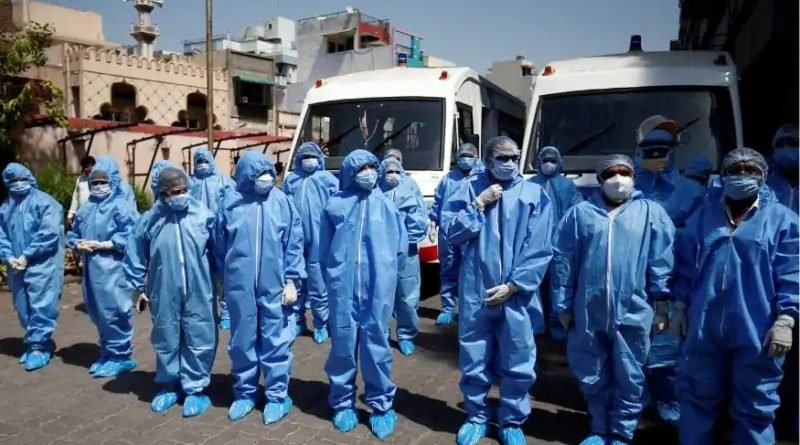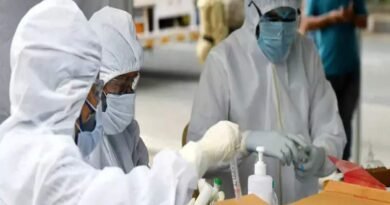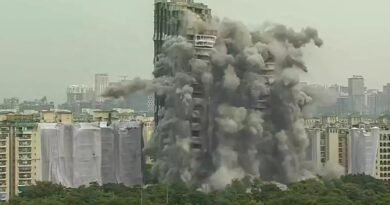Lack of Trust, Contagion Fears: Can a Law Undo Social & Psychological Factors Behind Attack on Doctors During Covid-19?
New Delhi Apr 27: “No physician, however conscientious or careful, can tell what day or hour he may not be the object of some undeserved attack, malicious accusation, black mail or suit for damages.” This statement, written 129 years ago in Journal of American Medical Association, has turned out to be prophetic, especially as India treads unchartered paths during a global pandemic.
The Centre last week issued an ordinance for protection of doctors, under which cases of assault on medics will be non-bailable. The scale of stigmatisation, however, points towards a more deep-rooted societal problem.
Ever since India imposed a nation-wide lockdown to curb the spread of coronavirus, doctors have endured ostracisation from their neighbours and landlords, been subjected to stone pelting when tracing contacts of a Covid-19 case and beaten by cops on their way back from inhumane shifts.
Social and job-induced responsibility was at crossroads when on April 9, two doctors came under attack in Madhya Pradesh’s Bhopal by a man in khakhi. Two resident doctors — Dr Yuvraj Singh and Dr Rituparna Jana – from the All India Institute of Medical Sciences (AIIMS, Bhopal) were returning home after emergency duty at the hospital when a police patrol party not only assaulted them, but even abused and blamed them for spreading coronavirus. While Dr Singh’s hand was fractured, Dr Rituparna sustained injuries on her leg.
The mental and physical harassment hit its peak last week when a doctor in Chennai, who died after being infected with the coronavirus, was refused a proper burial by locals who protested at the cemetery. As the mob pelted stones and attacked the ambulance, his colleagues had to dig a grave with bare hands to bury him.
In view of the rising complaints, Cabinet minister Prakash Javadekar last Wednesday said, “Changes in the Epidemic Diseases Act through ordinance have been approved by the cabinet. Offences will be made non-bailable and cognizable.”
The Centre ruled that investigations will be completed in 30 days. There will be stringent punishments, including fines up to Rs 2 lakh. Serious cases will entail imprisonment up to seven years and fine up to Rs 5 lakh.
While the ordinance may act as a deterrent, the rot writhes far deeper.
Declining Trust in Healthcare System
Given that India places doctors highly in society, violence against them may seem unlikely. But, according to a study by the Indian Medical Association, over 75 per cent of doctors have faced violence at work. Citizens across the country have also expressed their trust deficit in India’s healthcare system time and again.
According to a joint survey by EY and The Federation of Indian Chambers of Commerce and Industry, ‘Re-engineering Indian Healthcare 2.0′, at least 60 per cent patients surveyed in 2019 believe that hospitals did not act in their best interests, as against 37 per cent patients in 2016.
The results were worse in a separate survey conducted in 2018. Over 92 per cent people said they do not trust healthcare system in India, with hospital being the most distrusted organisation followed by Pharma and insurance companies, as per annual survey by fitness device firm GOQii.
While this in no way justifies the attacks on doctors, it helps understand the psyche behind it. The condemned phenomenon is also fairly global.
A local news reporter in Madhya Pradesh’s Indore visited the area a week after residents there had violently chased out a team of doctors who were there tracing contacts of a positive coronavirus patient. He informed News18 about his conversations with residents who were not exactly involved in violence but where witnesses.
“People there told me that they were scared. They thought doctors will conduct tests and quarantine all of them. Some of them even believed that they will be sent to isolation centres where they will not be able to meet or see anyone for an extended period of time,” said Brajesh Thakur. The lack of information and trust in medical experts was clear.
On April 1, a team of doctors, ASHA workers and revenue officials had visited the area to identify the family members of a 65-year-old man who died after having been infected with coronavirus. Two women doctors were injured in the attack and had to be rescued by police. The shocking assault came two days after locals from the Ranipura area of the city allegedly spat at officials and abused them during screening procedures.
The same incident also brought to light the menace that is probably as potent as the virus itself, fake news.
A resident of the area later revealed in a news report that residents were suspicious of health workers after fake videos started doing the rounds. The videos claimed that healthy Muslims were being taken away and injected with the virus.
A sizeable share of the blame also needs to be borne by news media industry.
A research paper published last year by Digant Shastri, National President of Indian Academy of Pediatrics, notes “sensationalisation by media” as of the key reasons behind attack on doctors. The mainstream media lacks what forms the very foundation of reporting during a humanitarian crisis: nuance.
“As a hypothetical example, a television reporter shouting at the medical superintendent of a Delhi hospital reeling under a load of dengue patients as to why antimalarials were not given to a patient who died of dengue. This is done with an air of ‘knowledge’ that viewers would be convinced that not giving antimalarials to a patient of dengue in shock was medical negligence of the highest order,” wrote Neeraj Nagpal, convener, Medicos Legal Action Group, a registered trust of qualified doctors, in a research paper published by The National Medical Journal of India.
Also, barring a few, none of the print, electronic and digital news outlets contribute in busting fake news.
Among other causes of violence against doctors in India are the deplorable conditions in which patients are treated at government hospitals.
Last month, an Agra woman hit the headlines when she resisted the option of being isolated at a public health facility even though her husband began to show Covid-19 symptoms. “The sight of the unhygienic condition of the toilets made her retch,” her brother-in-law told the Times of India newspaper.
The incident was not solitary. On March 9, a coronavirus suspect escaped from a government hospital’s isolation ward in Mangaluru, arguing that he preferred to seek private treatment. In Manesar, where the Indian Army runs a quarantine facility, patients raised an alarm for better facilities that resulted in the police being called in to control the situation.
Several patients complained of cockroaches, dirty toilets and lack of proper food in Covid-19 hospitals. This leads to fear among those approached by doctors for testing, resulting in the behaviour that still cannot be justified.
Behavioural Immune System
Pandemics are generally unprecedented for a generation. They take a serious toll, for the masses, mostly on the mind. Also, human minds are evolved for socialisation. Any attempt at quarantine for an extended period of time can put individuals off the grid. Therefore, it is important to understand how events such as a sudden, prolonged lockdown, with no clarity of its end, affect humans mentally.
Mark Schaller, Department of Psychology, University of British Columbia, wrote that humans evolved a set of unconscious psychological responses — which he has termed the “behavioural immune system” — to act as a first line of defence to reduce contact with potential pathogens during a pandemic.
The disgust response is one of the most obvious components of the behavioural immune system. For example, when individuals avoid things that smell bad or food that they believe to be unclean, they are instinctively trying to steer clear of potential contagion.
The behaviour is similarly portrayed in interactions with people. Any suspicious or potential carrier is automatically avoided to minimise the spread of disease, leading to a kind of instinctive social distancing. However, this can at times be quite crude. This means the responses are often misplaced, and may be triggered by irrelevant information.
This explains the incident that took place in Gujarat’s Surat on April 6. Dr. Sanjibani Panigrahi was inordinately harassed merely for being a doctor and treating Covid-19 patients. Working at the government-run civil hospital in the city, she was ridiculed as a carrier of coronavirus by her neighbours. When she did not pay any heed, her neighbour obstructed her from entering her own house while mouthing obscenities. The 34-year-old put out two videos that clearly portrayed the harassment.
A study by Natsumi Sawada from McGill University found that people develop a fear of outsiders when they feel vulnerable to infection.
The study established practical depiction in several cases reported across the country where healthcare professionals described the growing stigma they had to face from their neighbours and landlords, resulting in many being refused taxis, barricaded from their own homes, or made homeless.
In order to find help, Resident Doctors’ Association of All India Institute of Medical Sciences on March 24 wrote to the government. “Many doctors are stranded on the roads with their entire luggage, nowhere to go, across the country,” they said in the letter. In both Delhi and West Bengal, the government has now ordered action against anyone threatening to evict healthcare workers.
Several women who work as private ayahs in hospitals also reported that they have either been asked to vacate their rented occupancies or been told to stay away from the community till the pandemic is finally over.
Having listed the psychological reasons, it is important to remember that people always had these deep-rooted biases. An increased threat of disease simply hardens their positions.
David J Ley, a clinical psychologist in New Mexico, also goes to the extent of writing, “xenophobia in response to pandemics is (sadly) normal.”
Is Legislative Action Enough?
President Ram Nath Kovind on last Wednesday approved The Epidemic Diseases (Amendment) Ordinance, 2020, aimed at protecting healthcare professionals against violence during health crises such as the Covid-19.
The approval makes not just attacks on healthcare personnel, but also those on their property, including their living and working premises, cognizable, non-bailable offences.
The question whether the legislation is enough to change social and psychological inclinations remains to be analysed.
Most laws wanting to change social behaviours resulting from deep-rooted underlying causes have not been able to. For example, several laws have been passed in the US to end racial discrimination. Despite these, in a study among Airbnb customers, researchers at Harvard Business School found that African Americans were 16 per cent less likely to be accepted as guests than Caucasians. The study could not find any variable beyond race to explain this attitude.
Fear of punishment may be the single most significant factor behind the argument of implementing a law to enforce a behavioural change. It may be defined as when one has to face the repercussions in the guise of penalty or imprisonment, people avoid breaking the laws.
However, laws aimed at managing public behaviour need other forms of intervention. Dr Shastri in his paper highlights a few, in this case.
There needs to be a complete overhaul of the existing economic system and healthcare system. “Our country’s health budget spending is meagre (approximately 2 per cent) as compared to that of western countries. Raising budget to address the problem of poor doctor-population ratio is the need of the hour,” the paper noted.
Improvement of services in a global fashion, employment of adequate number of doctors and ensuring regular communication with patients are some of the ways that confidence of the society can be won back, he wrote.
Meanwhile, it may be wrong to conclude that laws have always failed to bring about societal changes.
Several measures, including health warnings, were used to curtail smoking. But one factor that has demonstrably contributed to a sustained decline in smoking was a ban on it in public places. One of the first pieces of legislation to curb smoking in public places followed an order of the Kerala High Court, way back in 1999.
It is only safe to say that while laws may act as antidotes, addressing the core issue may be the much needed vaccine.
Source: News18




